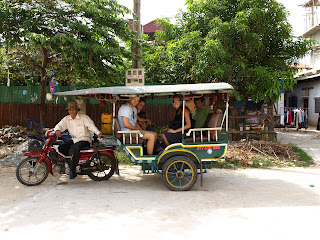
"The fifteenth day, of the tenth month, of the Khmer calendar marks the Pchum Ben festival. This is a time when the spirits of the dead ancestors walk the Earth. And the living can ease their suffering by offering them food to eat. At four in the morning, nearly all of the residents of Phnom Penh gather at the temple with offerings of rice, which they toss on the ground, feeding the dead ancestors.
According to Buddhist beliefs, the lives that we live, after death, are predicated by the actions that we took when we were living. Minor infractions would be punished with small punishments, such as being an unattractive ghost or having a small mouth. With a small mouth, it is hard to eat. Other, more severe, punishments could include being crippled or having no mouth at all.
At 8:00 AM, people return to the temple, with offerings for the monks. "They don't just give food," explains Mey Sameth, who was a monk for seven years. "They bring money and other things as well. As a monk we looked forward to this period all year long, because we could get new clothing and good food."
At 10:00 the people return with more food, which will be shared between monks and poor people. Os many of the Buddhist traditions seem to relate to feeding the poor. Disabled people also crowd around the temple begging alms. To give help to the less-fortunate, particularly during Pchum Ben, is to acquire merit. Many people explained that the offerings they made during the festival were to cancel out past sins.
Between 5:00-7:00 PM there will be more prayers for the dead. Most modern Khmers will say that the festival lasts fifteen days, ending on the fifteenth of the month. In actuality, the ancient, traditional festival lasted three months, ending on the fifteenth day, of the tenth month of the year.

The last four days of the festival were public holidays in Cambodia. Most Khmers visited the province where they were born, where they had family reunions. In observing friends and colleagues, it was amazing to see that even people who considered themselves only marginally religious still took the Pchum Ben festival seriously. They felt a real obligation to feed their ancestors, lest their suffering should continue. Even friends who claimed to have converted to Christianity, and who attended church regularly, took time out of their schedule to make the early morning pilgrimage to the temple, and feed the ancestors.
The Buddhist religion is such an integral part of the Khmer culture that neither political upheaval, economic crisis, the spread of foreign religions, or the intervention of modern society will shake the fundamentals of Khmer beliefs. It is refreshing to see that, although many aspects of the Khmer culture were lost during the Regime, the Khmers have managed to maintain their religious devotion and their family-centered way of life."






